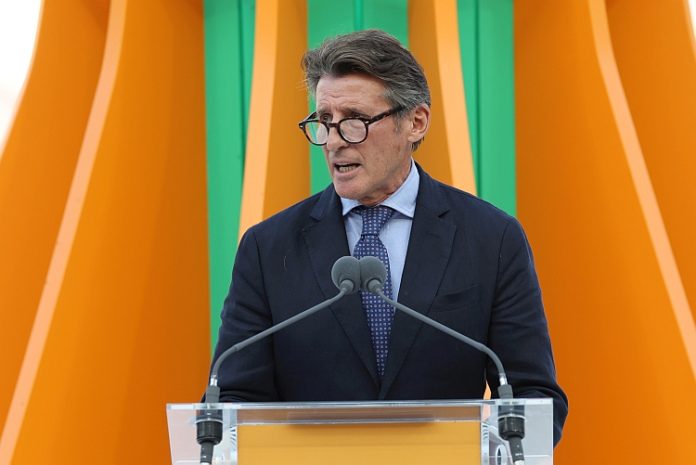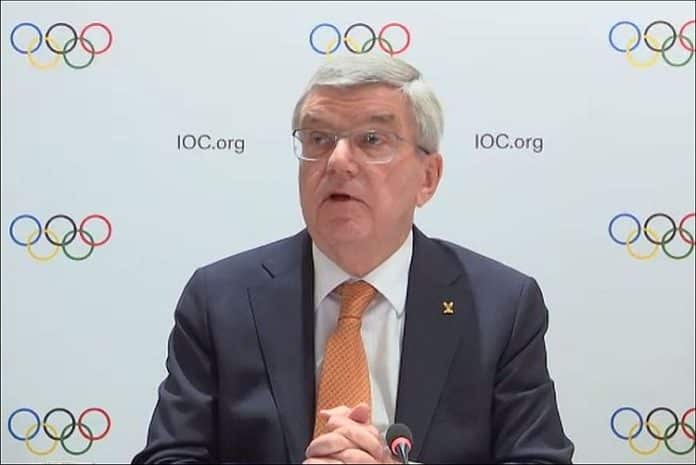★ The Sports Examiner: Chronicling the key competitive, economic and political forces shaping elite sport and the Olympic Movement.★
★ To get the daily Sports Examiner Recap by e-mail: sign up here! ★
≡ IOC PRESIDENTIAL ELECTION ≡
“We have to remember one critical factor: we are a sporting organization. Sport, as I know, can shine a spotlight in extraordinary ways. On human rights, on procurement patterns, on modern slavery, on climate change, and sport should have something to say about that. But that is not how we should be defining ourselves.
“We should be defining ourselves as a sporting organization that has the ability to transform the lives of young people through sport. So we need to remember the unique value that the Olympic Movement brings to sport. We’re a sporting organization.
“Secondly, the Holy Grail in any sporting organization – believe me, I understand that as an athlete, I understood it as a working journalist, I understood it as the President of World Athletics, as a National Olympic Committee president, as the bid chair in London and the organizing committee – the biggest challenge we all have is making sure young people choose sport as a way of fashioning their future.
“I know it is the most potent social worker in all our communities, the deftest of diplomats when it is properly exercised by government and the best policy that government will ever have, in economic development, in social development, in health, and in education. That’s the second point.
“The third point is, we need a membership that is empowered to help shape that journey. And I have concluded, from my many discussions, that there are talented members sitting around me, some of them far smarter than me, whose skill and experience is not being utilized properly.
“And the one thing I know that I’m very good at, and I don’t think I could have delivered in that way I’ve delivered across a range of activities, is the ability to build teams.”
In these comments, taking up just more than a minute during an hour forum organized by the International Sports Journalists Association (AIPS), World Athletics President Sebastian Coe (GBR) crystalized his pitch to be the President of the International Olympic Committee, to be decided on 20 March at the IOC Session in Greece.
Coe, ever enthusiastic and speaking from the European Athletics Indoor Championships in Apeldoorn (NED), explained that the IOC Presidency “is a role that I felt I’d been pretty much in training for most of my life,” detailing his experiences as a two-time Olympic 1,500 m champion, head of an Olympic organizing committee, head of a National Olympic Committee, head of World Athletics, founder of a sports marketing company, a government minister and so on. He really has been on all sides of the Olympic Movement, a breadth of experience which is unmatched by any of the other candidates.
He emphasized the importance of using the talents of the IOC members to meet the challenges, and having them more deeply involved:
“We need to meet more often. We need to have more space. We need to work more closely, more collaboratively with our National Olympic Committees and our International Federations. And I know how important those stakeholders are, because I’ve been the president in both those spaces.
“So we need to bring people together, but we need to give more space for debate. And one of the things I am really open about is that I I do get across the line in a couple of weeks time, look, the first thing I will do is I will set a date in our calendars, while we’re all there and take the membership away, three of four days, where – to mix my metaphors – we will simply put our foot on the ball and figure out what it is we want to achieve in the next 10 years, how we’re going to do it and how do we define ourselves.
“And this has to be a member-led organization. And in a good organization, you have good curation. You have co-curation from members and you have co-curation from really talented, world-class executives, and I know I have that at World Athletics.”
In his many discussions with other IOC members, but also with many others in the Olympic Movement, he also recognizes the position of IOC leadership within its ecosystem:
● “As a potential president of the International Olympic Committee, I want to work very much closer with the International Federations, I want to work more closely with the National Olympic Committees, I want to work more closely with broadcasters, and with media, but I also want to work very closely with the athletes. The athletes are an essential part of this journey. And each one of those stakeholders have their own interdependencies and those interdependencies depend on clarity of thinking from the largest and most influential sporting organization in the world, which is the International Olympic Committee.
“We should be taking thought leadership positions and creating guidelines and principles for International Federations and certainly NOCs. And that’s what they’ve told me that they want.”
● “We have commercial challenges, the commercial model is out of date, I know that. It’s not changing, it changed. I’ve been in the sports marketing business for the last 30 years; at the moment, we [IOC] have transactional sponsorships. They have to become collaborative partnerships.
“We have to bring the commercial partners to the table and you need to create brands that want to be there and are able to activate in marketplaces in many of your countries in markets that will really create new opportunities, yes, again, for the athletes.”
● “The days of command-and-control from the center have to be over. They’ve been out of date for 30 years. We have to open the windows, there has to be oxygen and we have to have collaborative discussions. I would certainly encourage a discussion in that space.”
Coe was asked, as has been the format in this seventh AIPS forum for the IOC candidates, about the hot-button issues in Olympic sport today:
● On dealing with doping:
Coe, with understandable pride, pointed to his creation of the highly-regarded Athletics Integrity Unit within athletics, “where we have an independent unit; I think most people now consider it to be gold-standard,” which covers all forms of cheating, not just doping.
“You have to have fair, free, open competition and you can’t have athletes lining up in lane four worrying that there are better sets of doctors or chemists in lanes three or five,” and he said an important outcome of the Athletics Integrity Unit is that “it’s given confidence back to competitors,” especially having been removed from the control structure of the federation.
● On dealing with worldwide tensions that affect sport:
“Nobody is going to sit here suggesting the world isn’t complicated. But I think as a historian, if I may say so, I’m not sure there’s any generation that hasn’t been able to point – at that moment – to the complexity of the world they live in.
“Sport has been through the complexities of the Cold War. It has been through conflagrations, it has been through challenges, social and cultural. I’m not sure that this is any different. And the principles absolutely remain the same. You can only deal with what you have in front of you.
“And I’m not very good at responding to the observations of ‘what about’? Yes, there are lots of ‘what abouts,’ because the world isn’t perfect, but you have to deal, clearly and concisely with what you have in front of you.”
● On transgender athletes:
“The guiding principle for me is really simple, and it sits with the word integrity. The integrity of competition and the promotion and integrity of women’s sport, and if you lose sight of that, if you don’t have policies that are clear and unambiguous, you are going to get into difficult and dangerous territory.”
He emphasized: “We want young girls entering our sport that feel there are no barriers to what they can do.”
He was also asked about the World Athletics decision to give $50,000 in prize money to the winners at the Paris 2024 Olympic Games, the first time this was done by the International Federation. Coe explained that it was a decision taken with the agreement of the entire federation, and that he recognizes that the question – from an IOC perspective – is different:
“Nobody should conclude that if I become president of the International Olympic Committee in 13 days time, that [prize money] is simply implemented because we did it in World Athletics.
“That is a much broader conversation. I also recognize this is not a one-size-fits-all. We did it for a very particular reason in athletics and that was many of our competitors have transferable skills. In fact, envious skills for many federations out there. They make good baseball players, they make good basketball players, they make good fast bowlers at cricket, in some parts of the world, netball as well.
“So our athletes are in high demand, we wanted to make sure we created … where possible, the financial well-being for them, sometimes to maintain their presence in the sport, sometimes for another Olympic cycle, sometimes to give them a cushion when they retire, so they may have the ability to go back into higher education. …
“It was really give the athletes that third pillar of welfare that I talk about, alongside mental, which is critical, physical, of course, but actually financial welfare is part of the same picture for me.”
He added later, to be sure he was understood: “Nobody should run away with the idea that [prize money] is something that I would automatically assume every International Federation, every National Olympic Committee, is applicable. There is no one-size-fits-all when you’re talking about such complex issues.”
Coe underscored the importance, however, of supporting athletes in many ways, to help them financially. Not necessarily with prize money, but with other opportunities to monetize their achievements:
“In ‘26, next year, for our World Ultimate Athletics Championships, we’re going to be flying the top athletes, all the athletes, [with] their social-media teams, to Budapest, so they can curate and create their own content and promote their own sponsorships. We have to really free up the equity of the brand for the athletes, and that’s why I said in my [IOC candidate] presentation in Lausanne, it is so important we don’t just listen to the athletes, we share with them.”
Coe related his experience as a champion athlete to what he wants to bring to the IOC Presidency if elected:
“Every morning as a competitor, I woke up trying to figure out how I can be better tomorrow than I am today. How I can be better in a month’s time than I am today, and yes, I craved criticism. I had coaches around me that were prepared to give unvarnished, unchallenged views and we all moved in the same direction.
“So, of course, I always want the organization that I’m working to always want to be better. … I would take that same ambition into the Olympic headquarters in Lausanne and work with people to be as good as we possibly can and to build teams that allow those teams to deliver the best work of their lives on behalf of the athletes.
“I want everybody waking up every morning in that organization understanding they are there for one reason, and that is the delivery of opportunities for the athletes, and I will go to my grave knowing that is the only way you can sit there as an administrator and figure out what the future is.”
Observed: Coe is considered one of the favorites for the IOC Presidency, along with Kirsty Coventry (ZIM) and Spain’s Juan Antonio Samaranch. He is incomparably experienced, well known and highly respected.
The prize money that World Athletics paid to the Paris winners was announced without forewarning or consultation with other International Federations, and Coe has apologized for insufficient communications, but not for the decision to pay the athletes. That has created concerns among some that Coe will go his own way if elected as the IOC President. Hence, his emphasis on team-building and member input.
Coe is a formidable contender and in a world of Trump, Putin, Xi and many other high-profile world leaders, his celebrity, experience and charisma brings instant credibility if elected. But in an election that will be decided with about 50 votes for a majority in whatever round the decision comes, it’s about the trust of the IOC members.
It’s going to be close.
¶
★ Receive our exclusive, weekday TSX Recap by e-mail by clicking here.
★ Sign up a friend to receive the TSX Recap by clicking here.
★ Please consider a donation here to keep this site going.
For our updated, 895-event International Sports Calendar for 2025 and beyond, by date and by sport, click here!

























